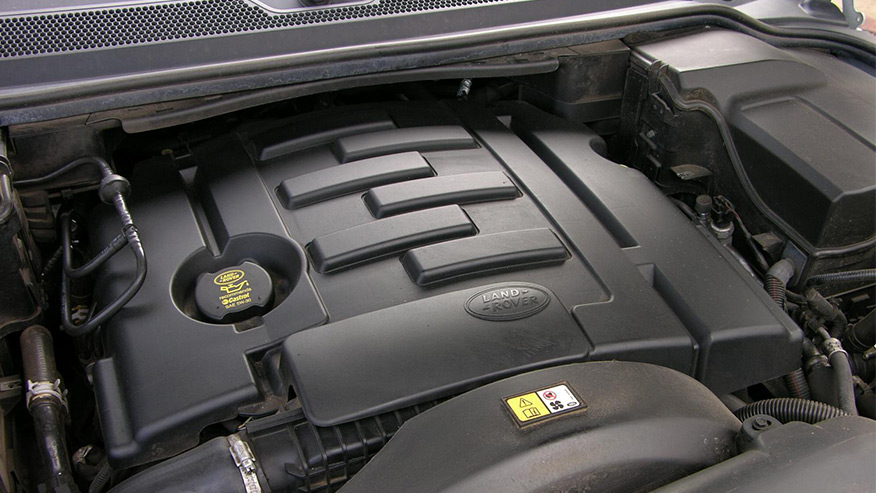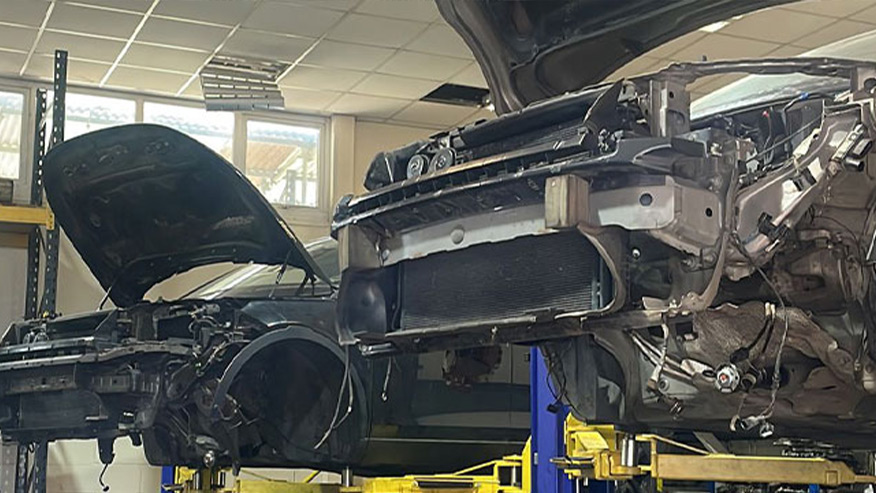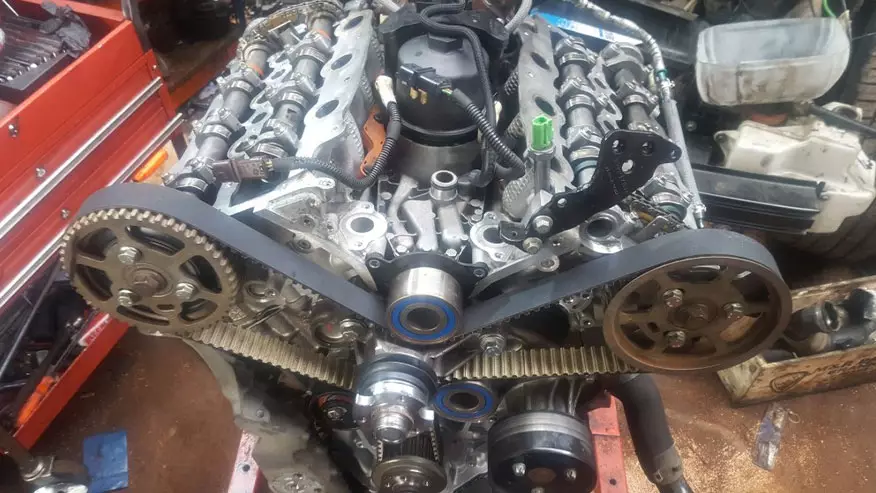Common Issues and Fixes for Discovery 3 Engines | Troubleshooting Guide

Common Issues and How to Fix Them: A Troubleshooting Guide for Discovery 3 Engines
The Discovery 3 engine is known for its power, but it’s not without issues. Strange noises or engine warning lights can spell trouble. Poor performance? A sign something’s wrong.
Excessive smoke? Watch out for serious engine problems. Overheating? It’s a major red flag.
In this troubleshooting guide, we’ll explore common engine issues and provide practical solutions. From oil leaks to timing belt troubles, we cover it all.
Discover preventative maintenance tips to keep your engine running smoothly. Read on to ensure your Discovery 3 engine performs at its best and avoid costly repairs.
Identifying Common Issues
Unusual noises: If you hear knocking, ticking, or any other strange sounds from the engine, it’s a red flag. Unusual noises from the engine can be alarming. Whether it’s knocking, ticking, or another sound, these noises should not be ignored. They often indicate problems that need immediate attention.
Engine warning lights: The dashboard lights are crucial indicators. When they light up, it’s time to pay attention. When your engine warning lights come on, it’s a clear sign something is wrong. These lights are designed to alert you to various issues, from minor to major.
Poor performance or reduced power: Is your Discovery 3 not as responsive as it used to be? This could signal an underlying problem. Reduced power or poor performance can also be a sign of trouble. If your vehicle struggles to accelerate or feels sluggish, there might be an underlying engine issue.
Excessive smoke from the exhaust: Thick smoke is more than just a nuisance; it points to engine trouble. Excessive smoke from the exhaust is another common warning sign. Different colours of smoke can indicate different problems, such as oil leaks or fuel system issues.
Overheating: An overheated engine can lead to serious damage. Always monitor your temperature gauge. Overheating is a serious concern. An engine that runs too hot can suffer significant damage. Keep an eye on your temperature gauge to avoid costly repairs.
Common Problems and Solutions
Oil Leaks
Oil leaks are a common issue with Discovery 3 engines. Identifying and addressing them quickly can prevent further damage.
Symptoms
One of the first signs of an oil leak is oil spots under the vehicle. You might also notice low oil levels when you check the dipstick. If left unchecked, these leaks can lead to more severe engine problems.
Causes
Oil leaks can occur for several reasons. Worn gaskets are a frequent culprit. Over time, these gaskets can deteriorate and fail to seal properly. Another common cause is a loose oil filter. If not tightened correctly, it can allow oil to seep out. Additionally, a damaged oil pan can also be a source of leaks. This damage can happen due to impacts with road debris or general wear and tear.
Solutions
Fortunately, fixing oil leaks is straightforward. Start by inspecting the gaskets. If they appear worn or damaged, replacing them is necessary. This can be done relatively quickly and will restore the seal. For a loose oil filter, simply tightening it may solve the problem. However, if the filter itself is faulty, replacing it is the best course of action.
In cases where the oil pan is damaged, repairs or replacement may be required. A cracked or dented oil pan cannot effectively contain the engine oil, leading to persistent leaks. Repair kits are available for minor damage, but severe cases might necessitate a complete replacement.
Regular inspections and timely maintenance can help prevent oil leaks and keep your Discovery 3 engine running smoothly. Keep an eye out for these symptoms and address them promptly to avoid bigger issues down the road.
EGR Valve Issues
The EGR valve is crucial for reducing emissions. When it malfunctions, the engine’s performance can suffer significantly.
Symptoms
One common issue with the Discovery 3 engine is problems with the EGR valve. Symptoms often include rough idling, poor acceleration, and increased emissions. Your vehicle might struggle to start or run unevenly at low speeds. Additionally, you may notice a significant drop in fuel efficiency.
Causes
A clogged or faulty EGR valve is usually the culprit behind these symptoms. The EGR valve recirculates a portion of the exhaust gases back into the engine’s intake, reducing emissions and improving efficiency. Over time, carbon deposits can build up, causing the valve to stick or fail.
Several factors contribute to this issue. Regular short trips, where the engine doesn’t fully warm up, can accelerate carbon buildup. Poor fuel quality can also exacerbate the problem. Consequently, maintaining a clean EGR valve is crucial for the engine’s performance and longevity.
Solutions
To address EGR valve issues, start with a thorough inspection. If you notice significant carbon buildup, cleaning the valve can often restore its function. Use a specialized EGR valve cleaner and follow the manufacturer’s instructions carefully. Removing and soaking the valve in a cleaning solution can also be effective.
In some cases, cleaning might not suffice. If the valve is severely clogged or damaged, replacing it is the best option. Purchase a high-quality replacement part and follow a detailed guide or seek professional help to ensure proper installation. Regular maintenance and using high-quality fuel can prevent future issues.
Turbocharger Problems
Symptoms
Turbocharger issues in the Discovery 3 engine can manifest in several ways. You might notice a significant loss of power when accelerating. This can make driving feel sluggish and unresponsive. Another common symptom is a high-pitched whistling noise. This sound is often more noticeable when the turbocharger is spooling up.

Additionally, excessive smoke from the exhaust is a telltale sign. The smoke may be blue or black, indicating burning oil or unburnt fuel.
Causes:
There are a few primary causes of turbocharger problems. One common cause is a worn or damaged turbocharger. Over time, the internal components can degrade, leading to performance issues. Another critical factor is oil starvation. The turbocharger relies on a steady supply of oil for lubrication and cooling. If the oil supply is compromised, it can cause severe damage. Blockages in the oil lines or using low-quality oil can contribute to this problem.
Solutions:
Addressing turbocharger problems requires thorough inspection and maintenance. Start by inspecting the turbocharger for visible damage or excessive wear. If the turbocharger is beyond repair, replacement is necessary. Ensure that you use high-quality parts designed for the Discovery 3 engine.
Additionally, maintaining proper oil supply is crucial. Regularly check the oil level and condition. Use the recommended oil grade and change it at the intervals suggested by the manufacturer. This helps prevent oil starvation and keeps the turbocharger running smoothly. Regular maintenance can extend the life of your turbocharger and improve overall engine performance.
Fuel Injector Failures
Symptoms
Fuel injector failures can cause a range of issues. Misfires are common. Your engine might sputter or run rough. Poor fuel economy is another symptom. You’ll notice you’re refueling more often. Engine knocking is also a sign. This is a distinct, metallic noise.
Causes
Clogged injectors are a primary cause. Over time, deposits build up. These restrict fuel flow. Faulty injectors can also be to blame. Wear and tear or electrical issues lead to failures. Contaminated fuel is another factor. It carries impurities that block injectors.
Solutions
Start with cleaning. Use a fuel injector cleaner additive. It’s an easy, preventative measure. For severe clogs, professional cleaning is best. Mechanics use specialized equipment. If cleaning doesn’t help, consider replacement. Faulty injectors need replacing. It’s a more permanent fix.
Routine maintenance can prevent issues. Regularly use high-quality fuel. This reduces the chance of contamination. Periodic fuel system cleaning helps too. Keep an eye on your vehicle’s performance. Early detection of symptoms can save you from costly repairs.
Timing Belt Issues
Symptoms
One of the most common symptoms of timing belt issues is a ticking noise coming from the engine. This sound is often a precursor to more serious problems. Additionally, engine misfires can occur when the timing belt is not functioning properly. Difficulty starting the engine is another sign. If you notice these issues, it’s crucial to address them promptly.

Causes
A worn or broken timing belt is the primary cause of these problems. Over time, the belt can deteriorate due to regular wear and tear. Harsh driving conditions and neglecting regular maintenance can accelerate this process. A damaged belt can disrupt the engine’s timing, leading to performance issues and potential engine damage. It’s essential to be aware of the timing belt’s condition.
Solutions
To resolve timing belt issues, regular inspections are key. Check the belt for signs of wear, such as cracks or fraying. Following the manufacturer’s recommendations for replacement intervals is crucial. Typically, timing belts should be replaced every 60,000 to 100,000 miles. Neglecting to replace a worn belt can result in severe engine damage. Therefore, timely replacement is vital.
If you’re unsure about inspecting the belt yourself, seek professional assistance. Mechanics can accurately assess the belt’s condition and perform replacements if necessary. Investing in this preventative measure can save you from costly repairs down the road.
Preventative Maintenance Tips
Maintaining your Discovery 3 engine is essential for long-term performance. Follow these preventative maintenance tips to ensure your engine runs smoothly.
- Regular oil changes and using high-quality oil. Consistent oil changes are crucial. High-quality oil reduces wear and tear on engine components.
- Keeping the cooling system in good condition. An efficient cooling system prevents overheating. Regularly check the coolant levels and look for leaks. Clean and flush the system as recommended.
- Regularly inspecting and replacing the air filter. A clean air filter improves fuel efficiency and engine performance. Inspect it frequently and replace it when dirty.
- Using fuel additives to keep the fuel system clean. Fuel additives can remove deposits and prevent buildup. This keeps the fuel system running efficiently and reduces engine knocking.
- Periodic professional engine diagnostics and servicing. Regular professional check-ups catch issues early. Mechanics can perform detailed diagnostics and recommend necessary repairs.
Transitioning between these tasks ensures comprehensive engine care. By following these tips, you can prevent costly repairs and extend your engine’s life. Each step contributes to overall engine health, providing peace of mind and better performance. Implement these practices into your routine, and your Discovery 3 engine will thank you.
Conclusion
In conclusion, keeping your Discovery 3 engine in top shape requires attention and care. Regular maintenance helps prevent major issues and ensures a smooth ride. Identify common problems early. Address them before they escalate.
Regular oil changes and high-quality oil are essential. This reduces wear and keeps your engine running smoothly. A well-maintained cooling system prevents overheating and costly repairs. Check your coolant levels and fix leaks promptly.
Clean air filters boost fuel efficiency and performance. Inspect and replace them regularly. Fuel additives keep your fuel system clean. They reduce deposits and prevent engine knocking.
Periodic professional diagnostics catch issues early. Regular check-ups by a mechanic ensure your engine stays in peak condition. Following these tips extends your engine’s life. It also enhances your driving experience.
Implement these practices. Your Discovery 3 engine will thank you. Enjoy better performance and peace of mind on the road.


